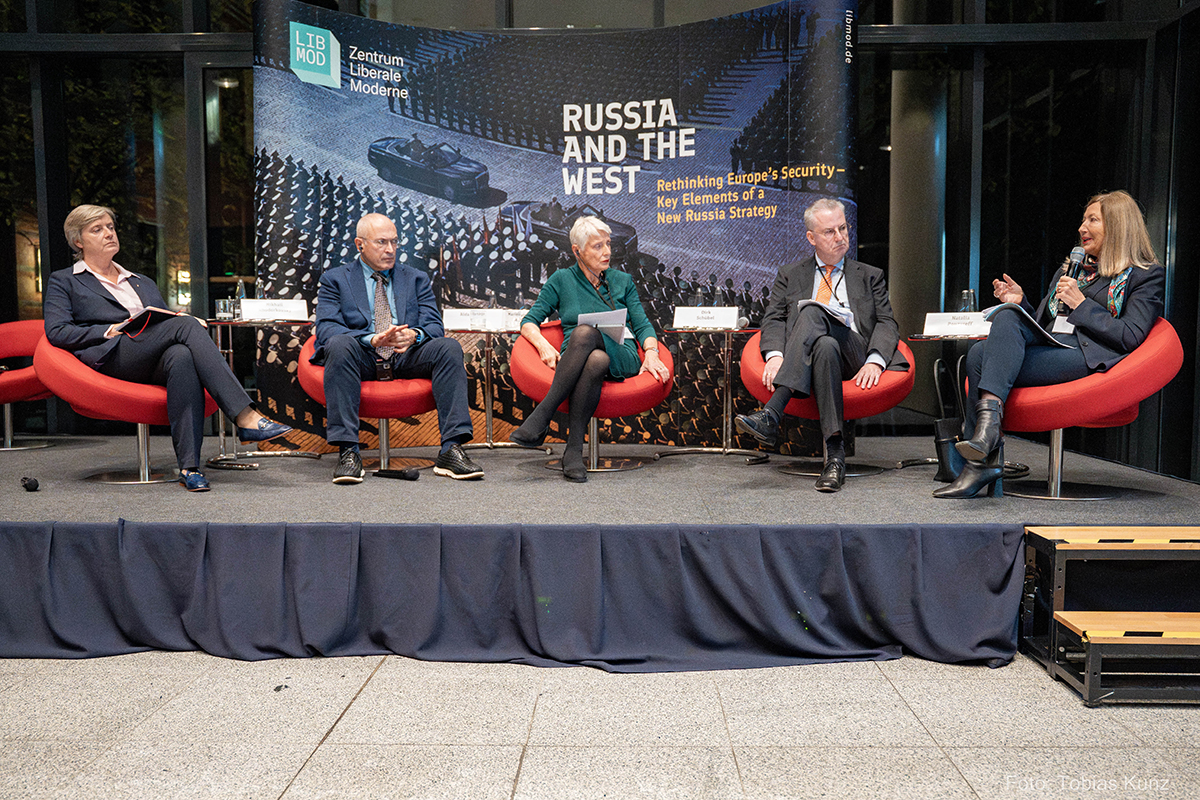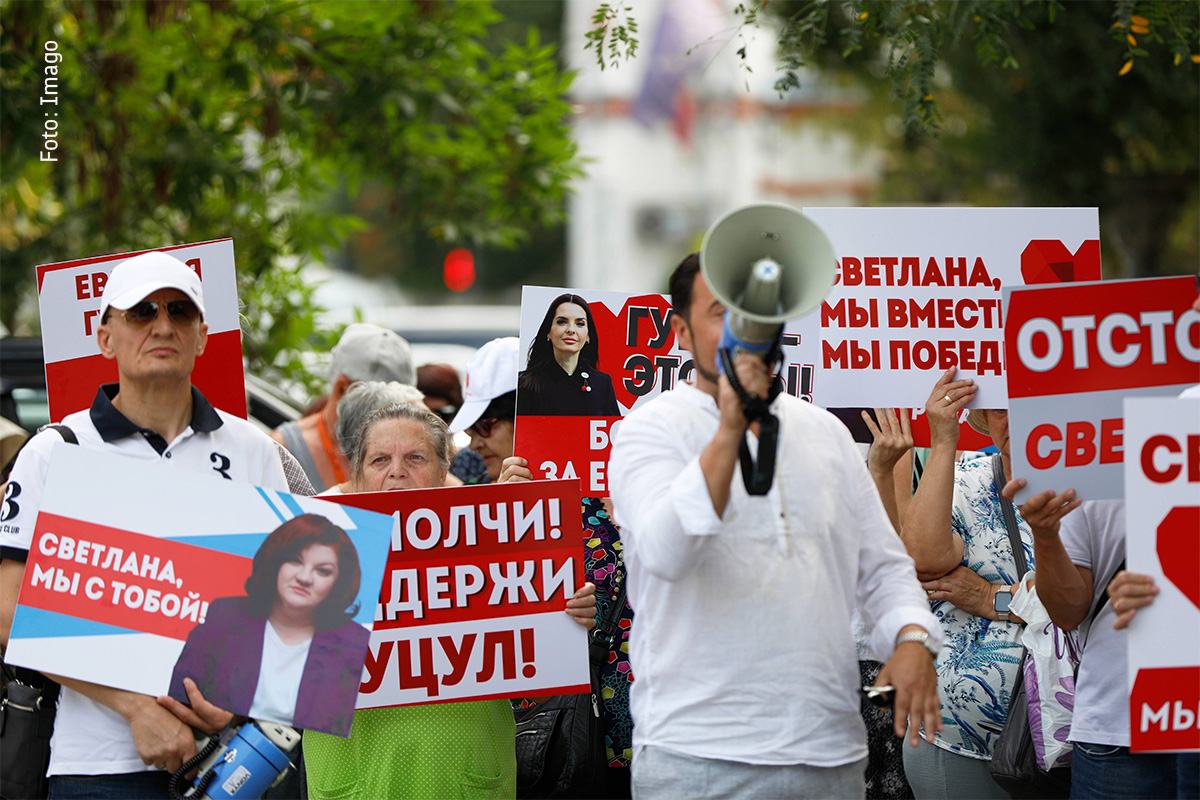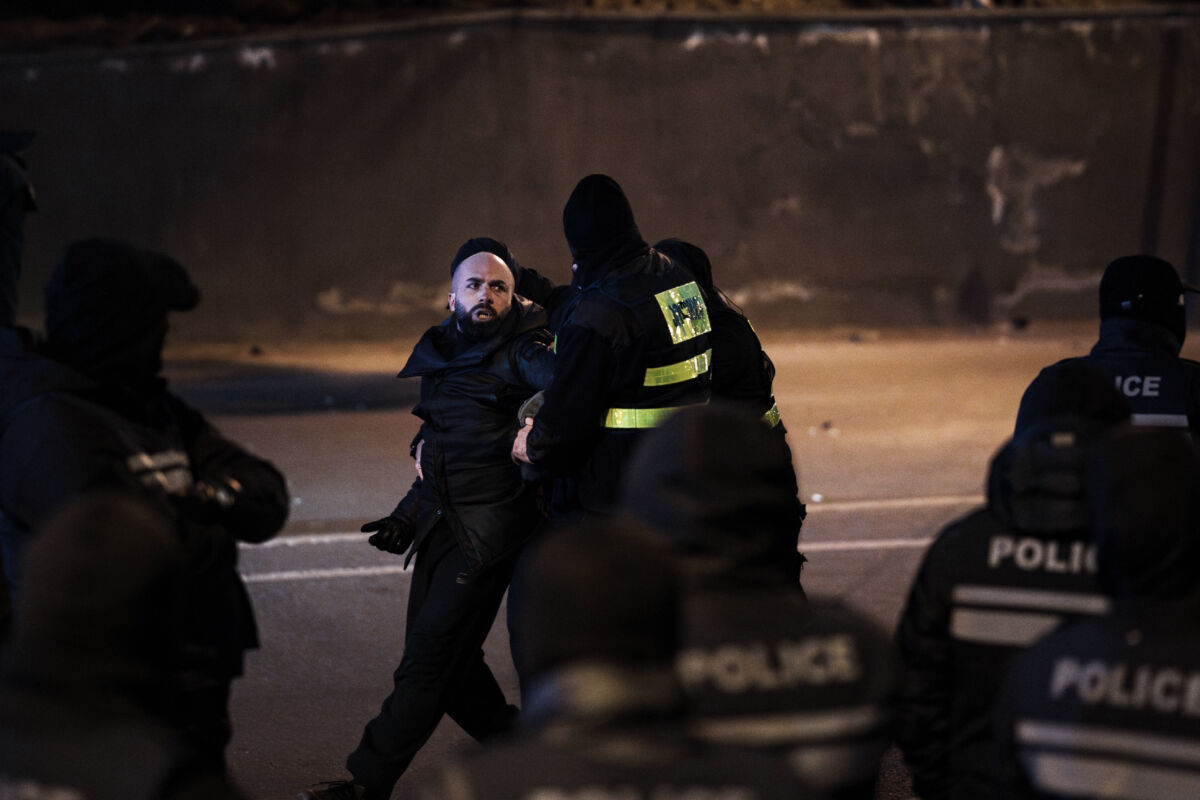Input Paper: Why Georgia should get the EU candidate status, despite obvious democratic backslide

As part of our project “Eastern Partnership Plus” we publish a series of input papers on the topic: Perspectives and Pathways to EU Candidate Status for Ukraine, Georgia and the Republic of Moldova.
For Georgia, Sergi Kapanadze analyzes the political situation and formulates his political recommendations to decision-makers in Berlin and Brussels as to why the EU should become a geopolitical actor and grant the trio EU candidate status in June.
“Favorable” geopolitical context
Russia’s aggression against Ukraine makes it clear that Ukrainians are fighting for the freedom, security and European future of the whole Eastern neighborhood. States between the West and Russia are in danger of losing their sovereignty, freedom and territories. Ukraine’s application to become a member of the EU happened in this changing geopolitical environment. Georgia’s and Moldova’s historical quest to cut loose from Russian influence and re-establish themselves as members of the European family of nations was manifested in the EU membership applications. Therefore, for the Trio partners, the EU membership applications are more than a simple bureaucratic procedure to accede to European institutions.
Worrisome domestic developments
Against this “favorable” geopolitical context, recent domestic news from Georgia has not been encouraging. What the EU leaders and officials in Berlin and elsewhere have heard in the last few years can be summed up as strands of worrisome developments, such as the practice of informal rule by an oligarch, controversial elections, arrest of political opponents, lingering political crisis, torn up political agreement mediated by Charles Michel in 2021, questions whether Russia is using Georgia to circumvent sanctions, widespread illegal wiretapping practice, attacks on free media, Government’s frequent criticism of the EU, non-compliance to EU recommendations regarding political and institutional processes and demonization of the longstanding friends of Georgia, who are now critical of backsliding democracy.
The worrisome headline of recent days is the arrest of the director of the largest opposition TV station – Mtavari TV. Charges are ridiculous – Nika Gvaramia was sentenced to 3 years for using the vehicle of the company he previously managed (Rustavi 2 TV) for family and private use. Rustavi 2 was critical of the Government when Gvaramia managed it and became a propagandist of the Georgian Dream after the owner and management were changed in 2019. A few months earlier, the founder of another opposition TV channel, Formula TV, was sentenced in absentia.
These are not the news a country seeking to join the European Union should generate. Following the dramatic geopolitical shift in the region, Georgia applied for the EU membership on March 3 and filled in the European Commission’s questionnaire by the May 12 deadline. Now the whole nation awaits the verdict of the European Commission and the European Council in June 2022.
Scenarios regarding Georgia’s EU application
We can draw several possible scenarios about the EU’s response to Georgia’s membership application.
Scenario 1: Georgia will be granted the European perspective, which it has sought from the European Union since 2013. This will put Georgia on the enlargement track, however, without a clear path, conditions and timeline.
Scenario 2: Georgia will be granted the European perspective and will be given a set of conditions, successful implementation of which could lead to the candidate status. These conditions could be vague and protracted in time or concrete and limited in time. The European Council might conclude that it will return to the decision on Georgia’s candidate status after a concrete period, pending the progress on the conditions.
Scenario 3: Georgia will be granted the EU candidate status; however, conditionality will be applied to the start of the accession negotiations. These conditions are highly likely to be detailed and strict.
There is an understanding in Georgia that Ukraine’s case will be reviewed separately by the European Commission and the Member States. Because of the geopolitical implications of the decision on Ukraine, there is a likelihood that Ukraine will receive special treatment in terms of the status, conditionalities and time frame. This is well understood and accepted in Tbilisi. However, Tbilisi also strongly believes that the Trio countries should not be separated in the context of the decision on candidate status, though differentiation and more-for-more (and less-for-less) principles should be applied as the relations proceed in the post-candidate period.
The political spectrum in Georgia, civil society organizations, and experts favor Scenario 3, even though the recent attacks on free media and political opponents make it harder for the champions of Georgia’s EU integration to argue Georgia’s case. This discussion paper attempts precisely that – to argue Georgia’s case despite worrisome democratic backsliding.
Arguments in favor of Georgia’s EU candidate status
Below are the ten arguments which trump the bad news and show why Georgia should still be granted the candidate status. In other words, these are the arguments in favor of Scenario 3.
First and most importantly: the EU’s decision to grant candidate status to Ukraine, Moldova and Georgia must be geopolitical and not a bureaucratic one. If the European Union counters Russia’s aggression by providing the enlargement track to the Trio countries, that decision ought to be a geopolitical one. Similarly, in a geopolitical move, in 2009, after Russia invaded Georgia, the EU decided to create the Eastern Partnership and grant Association agreements, DCFTAs and visa-free regimes to the Eastern neighbors. Withholding the candidate status now will be a serious blow to the geopolitical credibility of the West and the EU in Georgia and the broader neighborhood.
Second: the EU candidate status is not a reward for the Government and any particular party but for the country and people. Over 80% of the Georgians strongly support the European integration path. One of the reasons why no political party, including the ruling Georgian Dream, dared to deviate from the European path openly is the potential wrath of European minded Georgians. Strong European identity has been the main instrument that the EU could have used for exercising a more effective conditionality over the Georgian Dream in recent years. It was seldom so. Now is the time when by granting candidate status, the European Union can make the Georgian people its ally (or vice versa) in pressing the Georgian Dream to get serious about the reforms.
Third: candidate status does not equal membership. Many friends of Georgia claim that the Government, whose policies are so undemocratic, has nothing to do with the family of European nations. This might be true when it comes to membership. However, we all know that granting the candidate status is only a step toward membership, which will only happen after a long road consisting of opening accession negotiations, opening and closing 35 chapters of the accession treaty and final political decisions by the European Commission, Member States and the European Parliament. This process could take years and will undoubtedly be longer than the time horizon of the current ruling party. Albania received candidate status in 2014, opened negotiations six years later and is nowhere close to the EU membership yet.
Fourth: the EU’s candidate status must come with stringent conditions on the independence of the judiciary, halting of attacks against political opponents, the release of political prisoners, ensuring freedom of media, tackling corruption and other reforms from the Copenhagen political criteria playbook. These conditions should be linked with the start of accession negotiations and be measurable and limited in time. The EU must connect these conditions with the 2024 elections timeframe to oblige Georgian Dream to implement them immediately or risk losing elections. In other words, the EU has real leverage now, and if it grants Georgia the candidate status, the leverage can actually be effective. If, however, candidate status is not given, Georgia might revert to the post-Soviet abyss, and the Government of Georgia will have a free hand to continue non-democratic reforms and drag Georgia down the Lukashenka path.
Fifth: the EU should introduce the suspension clause for the candidate status if the reforms are not duly and fully implemented. With this clause, the EU could effectively enforce conditionality, something it has not done before vis-a-vis Georgia. The possible suspension will be like a threat of a political nuclear bomb and Damocles’ sword of conditionality. Fear of losing the candidate status will strongly discourage Georgian leaders from continuing their undemocratic rule. Failed political agreement mediated by Charles Michel is a good example. Because Georgian Dream knew that no repercussions would follow, it withdrew from the agreement it had signed months earlier and window-dressed the reforms it was supposed to undertake. Furthermore, with the suspension clause in place, Georgian Dream will not manage to “sell” the candidate status as a “reward” for its “democratic” governance – the argument that the concerned friends of Georgia often use.
Sixth: Georgia’s pro-western opposition, media and civil society need support from the West. That requires straight-jacketing of the Government into the set of heavy democratic conditions. Without the candidate status, these conditions will never be treated seriously, and the Government will have no stimulus to abide by them. Pro-Western forces in Georgia, similarly, will have no conditionality to refer to and will have even less power than today to press the Government internally.
Seventh: the EU risks making the same mistake as NATO in 2008 when Georgia was promised membership but was not given a Membership Action Plan. If Georgia receives the European perspective but is not given the candidate status, parallels will be impossible to ignore. It will encourage Russia to seek more influence over the decision-makers in Tbilisi and develop additional leverages, whether economic or military. When Moscow senses weakness, it usually acts swiftly and ruthlessly, while the EU often pursues a path-dependent course of action. Not granting the candidate status to Georgia will be interpreted by Moscow as a carte blanche for more aggressive actions in the next few years.
Eighth: if the EU does not grant Georgia the candidate status, pro-Russian forces in Georgia will gloat and strive. Their message that the EU only wants Ukrainians and Georgians to fight Russia while not giving in return even the “symbolic” candidate status will be hard to counter. Disinformation, the main instrument of pro-Russian forces in Georgia, will be re-equipped with a solid argument – ‘EU and NATO only snub Georgia, while Russia is strong and dangerous, so why look West?’ The resurgence of pro-Russian forces could, in turn, be exploited by the Georgian Dream government, which has previously gone at length to pacify pro-Russian forces through concessions and empowering. Georgian Dream banned the sale of agricultural land and defined marriage as a union of man and woman through constitutional changes to appease these forces. They might undertake further non-European steps that limit freedoms and liberties but are music to the ears of the Kremlin and its cronies in Georgia.
Ninth: Russia is now waiting for July for South Ossetians to hold a referendum on whether to join Russia. This referendum will likely be held in the same package as referenda in Donetsk, Luhansk and Kherson. Suppose Georgia steps into July without the candidate status; in that case, Russia will likely blackmail the Georgian Government with the threat of annexing South Ossetia unless the Georgian Government backtracks on the EU membership. Annexation of the Georgian territory by Russia, even if it does not change much in terms of the status quo, will be a severe de jure development. It will throw any hopes of ever restoring territorial integrity into a long box. Without the candidate status, no membership to aspire to and a threat of annexation imminent — the Georgian Government might yield further to the pressure. And pro-Kremlin forces inside Georgia will gloat and revive again.
Tenth: the Trio will be broken up if Ukraine receives the candidate status and Georgia (and Moldova) don’t. These three Eastern Partnership states created the Trio format in 2021 with an understanding that European integration only happens one region at a time. All three countries know that they will need to eventually pursue intra-Trio integration, similar to the Berlin Process for the Balkans. But if the three are put in two separate baskets, this could backfire, as Ukraine will attempt to de-link from Georgia, while Georgia might remain on the wrong side of the new iron curtain.
How about the Balkans?
We have often heard that any acceleration of the EU integration track for the Eastern Partners will be “unfair” to the Balkans. Austria and Germany are some of the several EU members who defend this argument. However, it is highly likely that the Balkan candidates will still join the EU well before the Eastern partners, so these concerns seem to be exaggerated.
The chart below shows that the time frame for the Balkan states receiving candidate status until the opening of accession negotiations varies from 1 (Serbia) to 15 (Northern Macedonia) years. Thus, granting the candidate status to Ukraine, Georgia and Moldova will only put these countries in the same enlargement basket as the Balkans and not in a more favorable position, as is often implied. If the political decision is made in the EU to allow best performing Balkan states to join, it could be done relatively fast. What will be more unfair is if the Eastern partners are put on the waiting list for the candidate status because of the lack of political decision on Balkan enlargement.

Moreover, the EU has consistently argued that each aspirant country has to be judged on its merit. According to the study published by the CEPS (Center of European Policy Studies) in 2021, Balkan and Eastern partnership states are “broadly comparable on the sum of political, legal and economic policy criteria”. Balkans are a little ahead on the political and legal criteria, while East Europeans fare better on trade and economic policies.¹ The report also illustrates that the three East European states are closer to the better Balkan states than the two laggards – Bosnia and Kosovo. Therefore, putting the Eastern Partnership states on an equal footing with some Balkan states is quite fair. This, however, does not mean that the Trio will leapfrog the Balkans in the membership race.
Conclusion
Georgia is at the crossroads of its European integration path. Russia’s aggression in Ukraine created momentum for the fast-tracking of EU integration for Ukraine, Georgia and Moldova. Of the possible scenarios, the most appealing for Georgia’s democratic development is granting a candidate status with heavy conditionality in relation to the possibility to open accession negotiations once the democratic reforms are conducted. Despite the serious backtracking of democracy in Georgia, the European Union could grant Georgia the candidate status but introduce the suspension clause if the democratic reversal continues.
The European Union must hold Georgia accountable to high democratic standards and press the Georgian Dream to immediately stop the undemocratic practices it has been engaged in for the last several years. This can be done more effectively with Georgia receiving the candidate status in June 2022. The few weeks between the publication of the Commission’s opinion and the meeting of the European Council on June 23 will be crucial for pushing the Georgian Dream to implement some of the long-overdue reforms and address the questions of politicized justice. Countries often deliver during the last days of the political decisions, so, if played well, the EU could exert maximum concessions from the Georgian Dream on the democratic reforms.
The problems with democracy that Georgia now faces will be overcome eventually by the Georgian people, as they have done so in 2003 and 2012 when the relative deprivation of needed reforms has climaxed into the collective action. Georgians will do so again. And having the candidate status will only strengthen the resolve of the Georgian people and democratic forces in the country to fight for their European future. While withholding the candidate’s status might demotivate Georgians and turn the nation into an easier prey for Russian disinformation and eventual take-over.
¹ Michael Emerson, “Building a New Momentum for European Integration of the Balkan and Eastern European Associates States”, 09.03.2021, Center of European Policy Studies
Sergi Kapanadze, Georgia’s Reforms Associates (GRASS)
Gefördert durch:


![]()
Did you like thike this article? If yes, you can support the independent editorial work and journalism of LibMod via a simple donation tool.
Donate via PayPal
![]()
We are recognized as a non-profit organization, accordingly donations are tax deductible. For a donation receipt (necessary for an amount over 200 EUR), please send your address data to finanzen@libmod.de
Related topics
Newsletter bestellen
Stay tuned with our regular newsletter about all our relevant subjects.





